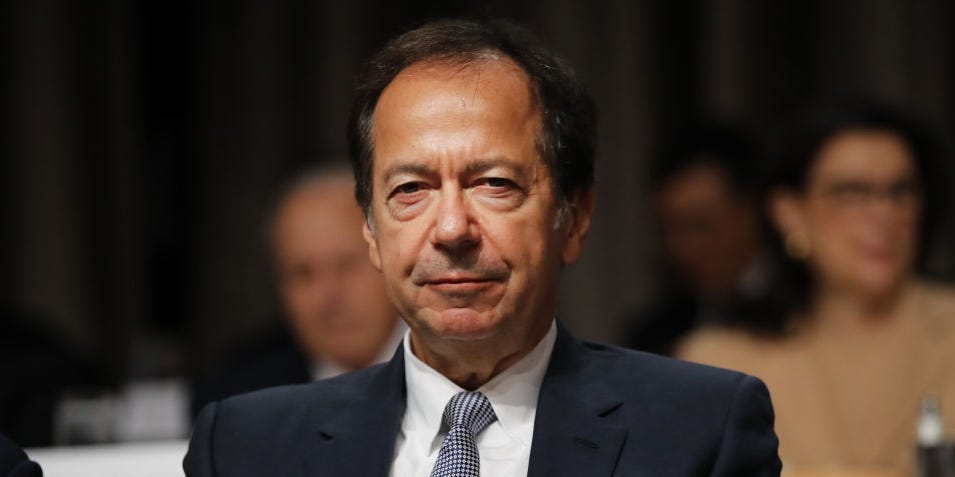
Spencer Platt/Getty
- John Paulson explained his iconic bet against the US housing bubble on a recent podcast.
- The billionaire investor detailed how he predicted and profited from a wave of mortgage defaults.
- Paulson also discussed his philanthropy and offered some career advice to young people.
- See more stories on Insider's business page.
John Paulson explained his famous bet against the US housing bubble in a recent episode of Finanze, a podcast hosted by Logan Lin, a 17-year-old student at a California high school.
The billionaire investor – who converted his Paulson & Co hedge fund into a family office last year – detailed how he anticipated the housing market's collapse, shorted about $25 billion of securities, and scored a $15 billion windfall. His wager was immortalized in the book "The Greatest Trade Ever: The Behind-the-Scenes Story of How John Paulson Defied Wall Street and Made Financial History."
Paulson discussed shorting a slew of Wall Street banks, mortgage lenders, and credit-rating agencies during the mid-2000s housing boom. He also touched on his philanthropic pursuits, and offered some advice for young people choosing a career.
Here are Paulson's 11 best quotes from the interview, lightly edited and condensed for clarity:
1. "The underwriting standards just plummeted. The mortgage terms were so ludicrous that a borrower with no credit history, a horrible credit rating, a history of never paying money back, and no cash to put down could borrow 110% of the purchase price of a house. You could actually buy a house with no money down, and get 10% of the purchase price in your pocket, as crazy as that may sound."
2. "It got to a point where the subprime-mortgage lenders would say, 'No credit, no money, no cash, no problem.'"
3. "It was like a very simple physics problem. If house-price growth kept slowing and went negative, and loan delinquencies kept rising, at some point the mortgage market would collapse and these mortgage-backed securities would sustain losses."
4. "It wasn't a crapshoot for us. We understood the trends of the mortgage market so well that we could almost predict with a degree of precision when the market would default."
5. "Even though the underlying fundamentals were deteriorating, the market pricing didn't adjust. It was an incredible opportunity to buy protection at very low cost, when it seemed obvious to us that these securities would default."
6. "The problem was the machinery, the factories that were just geared up to buy mortgages, securitize them, and sell them. The lenders were just oblivious to what was going on and they couldn't stop the machine."
7. "We only shorted the BBB tranche, where a loss of 7% would mean those securities would be extinguished. We predicted the losses on these pools would be in the 20% range, so those things were toast in our opinion."
8. "It was a very, very skewed trade where you lost a very small amount if it didn't work, but you made a fortune if it worked. That's why it's called the greatest trade ever. We got both the security and the timing right and were able to make that 100-to-one return."
9. "We focused on the institutions that had large quantities of subprime or poorly performing mortgages. We shorted New Century, Fannie Mae, Freddie Mac, Citibank, Washington Mutual, IndyMac, Bear Stearns, Lehman Brothers, and we were 100% right."
10. "Americans are a philanthropic people and we care about the wellbeing of other citizens. I grew up in a family where we weren't wealthy, but we always contributed to causes. As a child on Halloween, I used to trick-or-treat for UNICEF, rather than for candy."
11. "It's hard to be successful doing something you don't want to do. Maybe you wanna make movies, or maybe you're an artist, or maybe you like medicine, or science, or physics, or math. Ask yourself, 'What do I love doing? What would I do if I wasn't working? What am I passionate about?" - that's the area that you should pursue a career in."
